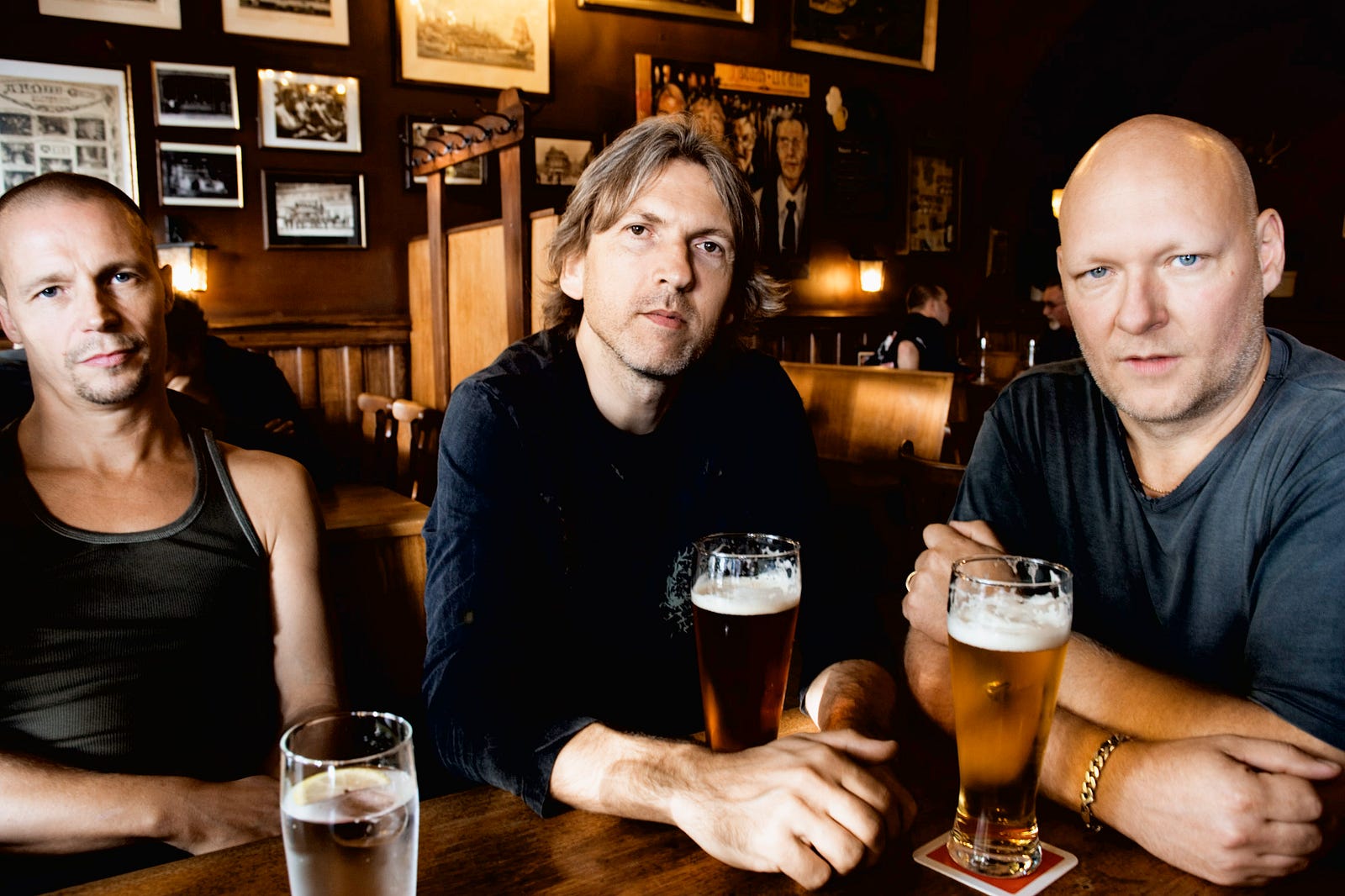Ten years ago, Esbjörn Svensson, the jazz pianist, died. But the game culture of Sweden has not disappeared with him. His most exciting successors come from Germany.
The bewilderment on YouTube is great. “Just discovered this band and immediately searched for tour dates”, writes the user “Jos442452” under a video of the Esbjörn Svensson Trio, short e.s.t., to add then: “Damn: / Instant unhappiness”. The grief is justified. Because the group does not appear for a long time. Ten years ago, on 14 June 2008, pianist and band name giver Esbjörn Svensson died at the age of 44 in a tragic diving accident in the archipelago of Stockholm.
In addition to the virtuoso mastery of the piano, Svensson possessed something that only the Swedes seem to have: an unmistakable flair for melodic phrases that instantly bring a grin to your face. If you like, Svensson was the avicii of jazz. An – in contrast to the DJ involuntarily – far too early outrun, who has made people happy beyond genre boundaries.
In the Berlin office of the German record company ACT, on which Svensson’s trio released their albums since their breakthrough “From Gagarin’s Point of View” in 1999, a photo hangs from carefree days. You can see a smirking Svensson pretending to play double bass, alongside his bandmate Dan Berglund, whom he stole the instrument from, and drummer Magnus Öström. The meanwhile gray drummer smiles at the picture that tells a lot about the e.s.t. group dynamics. The humor, the friendly connection, the willingness to exchange musical roles speaks from photography.
A double bass that hisses like the guitar of Jimi Hendrix. A pianist who turns his grand piano into a percussion instrument with a grip on the strings. A drummer who uses whammy effect and delays to turn a solo into an electroacoustic sound installation. All this is on “e.s.t. Live in London “(ACT / Edel), a 2005 recording of a concert at London’s Barbican Center. The previously unpublished recording has just been published on the tenth anniversary of the death of Esbjörn Svensson. Svensson’s friend Magnus Öström, with whom he had made music since childhood, does not resist the assumption that the concert will bring the trio to its peak. If you want to make clear why Svensson, Berglund and Öström were so popular in both the pop and jazz camps, the London recording is the perfect setting. It is equally a lot of fun and hurts immensely. Because Svensson, the mediator between Björk, Bach, Aphex Twin and Joe Zawinul, is no longer with us.
But e.s.t. is still present ten years after the death of the Swedish pianist. On the hit album “To Pimp a Butterly” by rapper Kendrick Lamar, for example, in the intro of the song “How Much a Dollar Cost” a sample is heard that sounds suspiciously like the Swedes. Bands like GoGo Penguin from England, the Southern German-Slovak trio ELF or the Swedish-Cuban-German Tingvall Trio show clear hints to e.s.t in their music. Anyone who wants can also discover elements in the pieces of the new piano romantics, such as Nils Frahm or Hauschka, which refer to Esbjörn Svensson. It can not be ignored: e.s.t., the Brad Mehldau Trio, which has risen parallel to world fame, or bands like The Bad Plus have sparked a revolution in jazz at the turn of the millennium, which continues to ache today.
Certainly: The combination of piano, bass and drums – comparable to the string quartet in classical music – has always played an important role in improvised music. From the bebop pioneer Bud Powell to the ingenious minimalist lover Ahmad Jamal and the virtuoso Oscar Peterson as the pianotrio leader, the list goes on, then there was the dream team Duke Ellington, Charles Mingus and Max Roach. And of course, the revolutionary Bill Evans, whose game concept in the sixties provided a previously unknown equality of instruments, as well as Keith Jarrett, whose influential trio with bassist Gary Peacock and drummer Jack DeJohnette the record market to this day amazing arrangements of pieces from the Great American Songbook gives – just with “After the Fall” a carefree, cheerful live recording from 1998 appeared.
But such a variety of piano trios as today have never existed in the history of jazz. And the currently most exciting ones come from Germany. For example, there is the trio of pianist Pablo Held, born in 1986. For 13 years there is the trio; The hypnotic-instinctive communication between hero, bassist Robert Landfermann and drummer Jonas Burgwinkel has long since caused a stir internationally. Former Miles Davis guitarist John Scofield has previously recorded an album with the three cologne, “Investigations”, the trio’s latest recording, has appeared on up-and-coming British label Edition Records. Titles such as “I’ll Dream of Flowers”, “Birkenhain” or “April Sun” are intricately twisted like a network of roots, yet as filigree as wildflowers, their pollen from spring-like gusts of wind over a meadow with Bill Evans’ Bach flowers, Cecil Taylor’s stinging nettles and the humus of modern classic are blown out.
“When I write something, I do not think about piano, bass or drums, but about Robert and Jonas. I hear her personality, mind and soul “, hero describes the organic approach of his trio. Accordingly unusual, the three also approach concerts. There are no previous agreements. You draw on the shared musical experience of 50 compositions and be surprised by each other. “After all, it’s like talking to three good friends. You can talk or be silent with them, “says Held.” You get inspired by the energy of the audience and not by the setlist that you set when you eat in the restaurant. We can not be more honest. “Trio totally, without safety net.
From a similar familiarity draws the trio of Berlin-based pianist Julia Hülsmann. She is married to her bassist Marc Muellbauer, drummer Heinrich Köbberling is a close friend. For ten years now, the trio has been releasing its CDs with the Munich-based record label ECM, which is also the label home of Keith Jarrett.
The trio was founded in its first form for an intermediate exam at the university and as a practice vehicle for standards, says the pianist. However, old Broadway hits no longer play any role in the music of Hülsmann, Muellbauer and Köbberling, as the “Sooner or Later” release published last year makes clear. In addition to finely spun chamber music compositions of the pianist, the bass often leaves the issues like a gift wrapped in velvet, including a piece by Radiohead, the elaboration of a melody from Kyrgyzstan and a handmade remix of solo phrases of legendary German jazz pianist Jutta Hipp , This is all so ripe, unagitatory and of course comprehensible that Hülsmann promptly got an e-mail from the United States. Sender: The big jazz couple Carla Bley and Steve Swallow. The pianist and the bassist wrote how great this recording was. “I really had to swallow,” says Hülsmann.
Michael Wollny can not complain about a lack of appreciation far beyond Germany. His trio CD “Weltentraum” was declared the best album of the year by the English journal “Jazzwise” in 2014, and the French Académie du Jazz voted him “European Jazz Musician of the Year”. On his 40th birthday, the pianist living in Leipzig is honored as if it were about his life’s work. Two trio albums, the recording of an appearance in the Wartburg as well as the studio recording “Oslo”, released in parallel (both ACT), for the musical birthday celebration the stage of the Berlin Philharmonic was freed for him, his drumming ego Eric Schaefer and bassist Christian Weber, at Hamburg’s Elbjazz he was the first artist in residence in the history of the festival.
Wollnys Trio shows compressed, which characterizes the German piano-bass-drums-triangle relationships: In addition to the first-class jazz training by influential musical personalities (Hülsmann, Held and Wollny, for example, invoke independently of each other on the British pianist John Taylor, who taught at the Cologne Conservatory for a long time) is there a highly creative way of dealing with one’s own cultural background? You draw from the entire canon of Central European piano and classical literature to the present day. For example, while American pianist Brad Mehldau recently released a Bach CD, Wollny’s “Oslo” Paul Hindemith collides with a stumbling hip-hop beat. He has also done similar things in the past with Alban Berg and Wolfgang Rihm.
Hülsmann, Held and Wollny are representative of the “new German jazz piano miracle”, as the magazine “Jazz Thing” recently titled. Listen to the trios of Julia Kadel, the first German on the traditional label Blue Note since Jutta Hipp in 1956, Laia Genc, Sebastian Sternal, Tim Allhoff, Benedikt Jahnel, Ludwig Hornung, Axel Kühn and Bernhard Schülers Triosence to find out which is all possible with piano, bass and drums. What Esbjörn Svensson and his colleagues once sowed drove the most magnificent flowers in Germany.







More Stories
CD review: George Benson – Dreams Do Come True: When George Benson Meets Robert Farnon – 2024: Video, CD cover
The band was tight as ever. The Warren Haynes Band cuts loose: Video, Photos
Interview with Alvin Queen: Feeling Good – I heard these tunes played by … Video, new CD cover, Photos